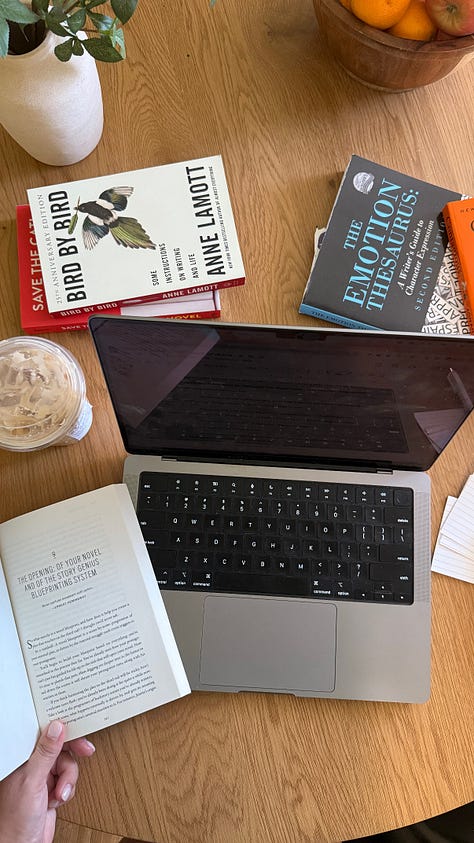All the Writing Resources I Found Helpful While Writing My First Book
What I read, studied, and practiced to turn a passing idea into a real draft
Notes from the Writing Desk. A behind-the-scenes look at writing my first novel, the lessons, tools, and tiny breakthroughs along the way.
When I first sat down to write my novel, I didn’t have a plan. I didn’t know how the story would end, what tools to use, or how much I didn’t yet know.
What started as a simple “let’s see what happens” moment quickly became an obsession with learning the craft of storytelling.
It started the way most creative things do, quietly, almost accidentally. One night, an idea hit me, and I opened a google doc to jot it down.
Most nights, I wrote after the house was quiet, when everyone was tucked in, the dishes were done, and the day finally exhaled. It wasn’t a long stretch of time, maybe two hours at most before I needed to head to bed myself, but it became my time.
I’d light a candle, turn on some low music, and open my laptop. The glow of the screen against the dark felt intimate, almost secret. like I was sneaking away to meet my characters. Sometimes I’d make tea, sometimes just water, depending on the night. The ritual became its own kind of rhythm, the gentle permission to slow down and listen for the next sentence.



Those late hours taught me how to write tired, to write through the noise of the day, and to trust that creativity doesn’t need a perfect schedule, just a small pocket of stillness and the willingness to show up in it.
At first, I didn’t take it seriously. I told myself it was just a passion project, something to tinker with on weekends, a hobby that might never leave my laptop. I’ve always been a big daydreamer, full of half-formed ideas and imaginary conversations, but I’d never tried to turn one into something real.
Still, I kept thinking about that spark of a story. So I made a deal with myself, just start. Even if I didn’t know how it would end. Even if it never became a full book.
And somehow, that small permission was all I needed.
The Early Learning Curve
In those first few weeks, I fell headfirst into research. Suddenly, my screen was filled with terms I’d never used before, plotting, character arcs, three-act structure, midpoint reversals.
I realized quickly that writing a book wasn’t just about having an idea. It was about learning a craft.
So, I did what any good beginner does, I signed up for a fiction writing class.
Keep reading with a 7-day free trial
Subscribe to The Second Act to keep reading this post and get 7 days of free access to the full post archives.


